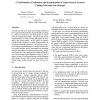Free Online Productivity Tools
i2Speak
i2Symbol
i2OCR
iTex2Img
iWeb2Print
iWeb2Shot
i2Type
iPdf2Split
iPdf2Merge
i2Bopomofo
i2Arabic
i2Style
i2Image
i2PDF
iLatex2Rtf
Sci2ools
FAST
2009
2009
A Performance Evaluation and Examination of Open-Source Erasure Coding Libraries for Storage
Over the past five years, large-scale storage installations have required fault-protection beyond RAID-5, leading to a flurry of research on and development of erasure codes for multiple disk failures. Numerous open-source implementations of various coding techniques are available to the general public. In this paper, we perform a head-to-head comparison of these implementations in encoding and decoding scenarios. Our goals are to compare codes and implementations, to discern whether theory matches practice, and to demonstrate how parameter selection, especially as it concerns memory, has a significant impact on a code's performance. Additional benefits are to give storage system designers an idea of what to expect in terms of coding performance when designing their storage systems, and to identify the places where further erasure coding research can have the most impact.
FAST 2009 | Large-scale Storage Installations | Multiple Disk Failures | Numerous Open-source Implementations | Operating System |
| Added | 17 Feb 2011 |
| Updated | 17 Feb 2011 |
| Type | Journal |
| Year | 2009 |
| Where | FAST |
| Authors | James S. Plank, Jianqiang Luo, Catherine D. Schuman, Lihao Xu, Zooko Wilcox-O'Hearn |
Comments (0)

